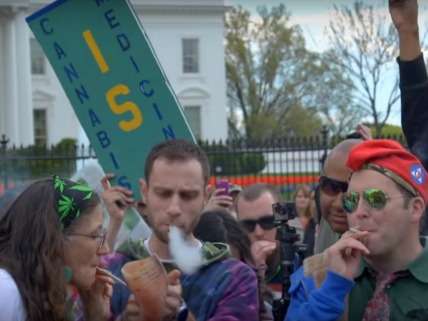Pot Smokers at White House Protest Obama's Disinterest in Reclassifying Marijuana
The president prefers to pretend that rescheduling requires congressional action.

More than 100 people smoked pot outside the White House on Saturday to protest marijuana's status as a Schedule I substance, the most restrictive category under the Controlled Substances Act (CSA). The protest was organized by the D.C. Cannabis Campaign, which sponsored the 2014 ballot initiative that legalized possession, home cultivation, and sharing of marijuana in the nation's capital. The group is frustrated by President Obama's failure to pursue administrative rescheduling of marijuana, despite his youthful cannabis consumption, his concession that marijuana is less dangerous than alcohol, and his mostly hands-off approach to state legalization.
Schedule I is supposedly reserved for drugs with a high abuse potential that have no accepted medical use and cannot be taken safely, even under a doctor's supervision. Although it is doubtful that marijuana meets any of those criteria, let alone all three of them, Obama has shown no interest in reclassifying it, insisting that such a decision requires action by Congress.
That's clearly not true. The CSA gives rescheduling authority to the attorney general, who has delegated that power to the Drug Enforcement Administration (DEA). The DEA insists that marijuana must remain in Schedule I because it has no "currently accepted medical use," which it says can be established only by the sort of large, expensive clinical trials that the Food and Drug Administration (FDA) requires before approving a new medicine. While federal courts have deferred to the DEA's interpretation of the CSA, the agency has discretion to change its mind.
Moving marijuana to a lower schedule—a step supported by the sponsors of the CARERS Act and the Democratic Party's presumptive presidential nominee—would facilitate medical research and could resolve a big income tax headache for state-licensed marijuana merchants, who are currently barred from deducting business expenses. It would also send a signal that could affect the prospects for state medical marijuana legislation and medical defenses in criminal cases. But rescheduling would not automatically make marijuana legally available as a medicine, since any preparation that doctors could prescribe would first have to be approved by the FDA.
By contrast, descheduling marijuana—removing it entirely from the list of controlled substances—would effectively repeal national pot prohibition, allowing people to use the drug for medical or recreational purposes without violating federal law. That seems to be the goal that the D.C. Cannabis Campaign has in mind, since it called Saturday's protest the "Emergency National Mobilization to Deschedule Cannabis." Yet removing marijuana from the CSA's schedules, as opposed to changing its classification, probably would require new legislation.
That's because the CSA says "if control is required by United States obligations under international treaties, conventions, or protocols in effect on October 27, 1970, the Attorney General shall issue an order controlling such drug under the schedule he deems most appropriate." Under the 1961 Single Convention on Narcotic Drugs, nonmedical production, distribution, and possession of cannabis are supposed to be criminalized.
That agreement, however, does not mean states are required to ban marijuana. The treaty says the obligations of signatories are subject to "constitutional limitations," and the U.S. Constitution gives states the leeway to make their own decisions about whether to criminalize marijuana-related conduct. Even if the Single Convention did not include that exception, a treaty cannot trump the Constitution.
The issue of marijuana policy in the District of Columbia, a jurisdiction subject to direct control by Congress, is somewhat different. But despite grumbling from hardcore drug warriors, Congress has allowed legalization to take effect in its own backyard, even while blocking plans to license and regulate commercial production and distribution.
That forbearance helps explain why the mass show of civil disobedience at the White House on Saturday did not result in any arrests. Although public cannabis consumption remains illegal in D.C., it is a civil offense punishable by a $25 fine. ABC News reports that local police cited two protesters. Federal law allows arrests for possession and prescribes more severe penalties, but "a Park Police spokeswoman told ABC News that they had no jurisdiction over the demonstrators since they remained on Pennsylvania Avenue and did not enter the park area."
Reason TV covered the protest:


Show Comments (44)